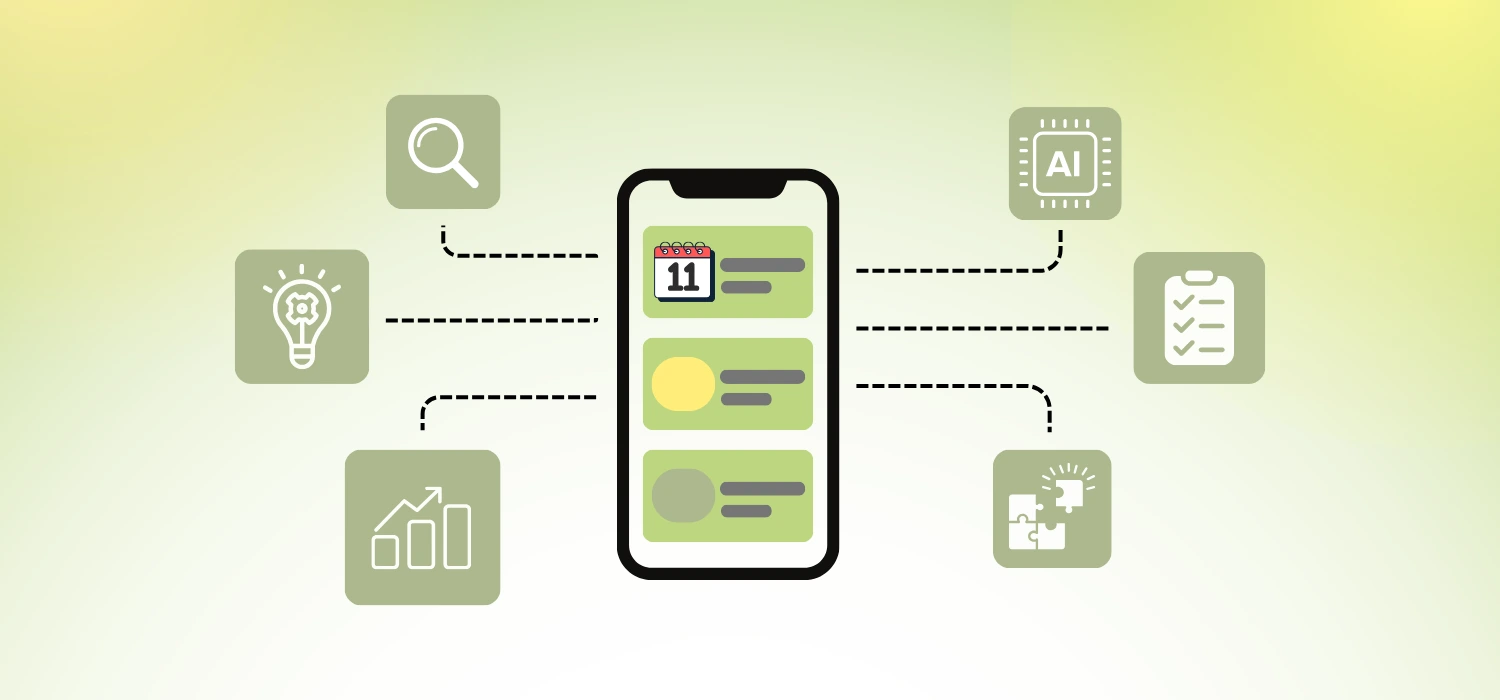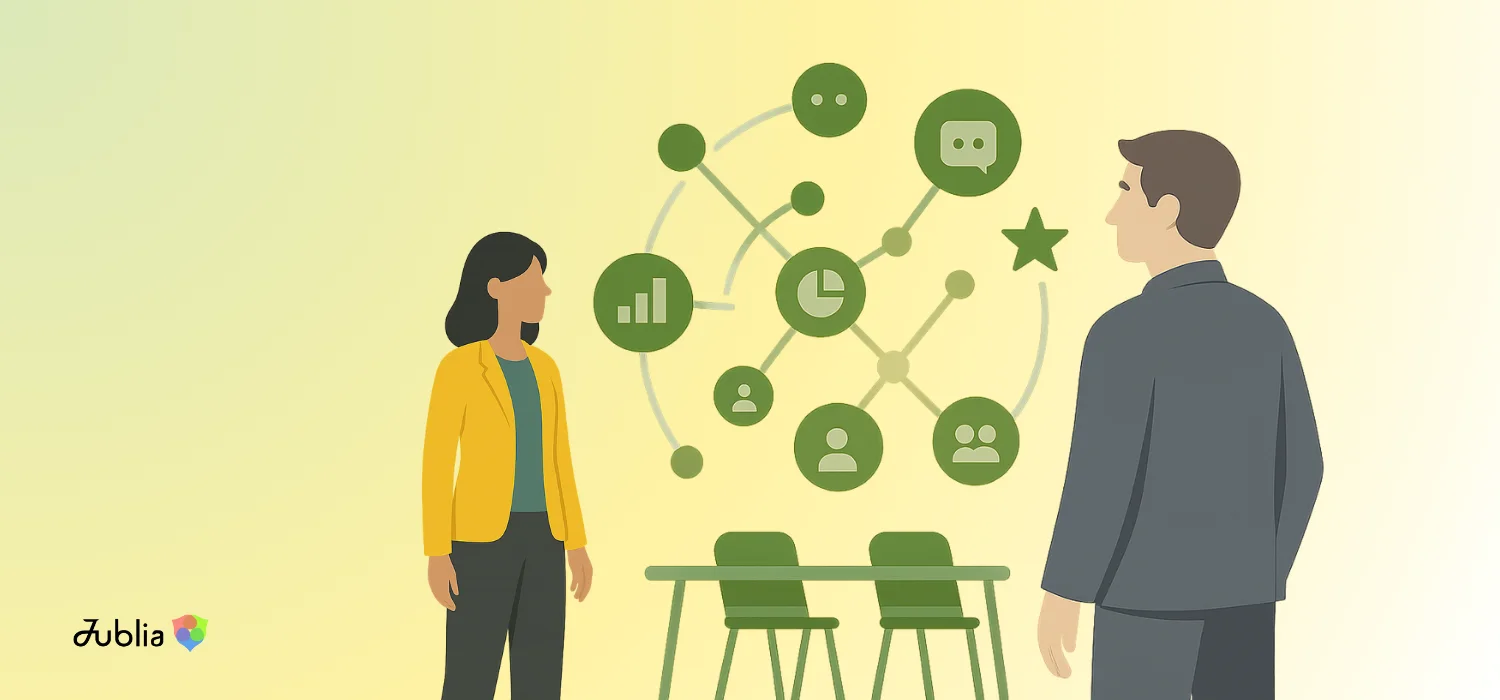Join our newsletter for the inside scoop on Jublia and the events industry


Planning an event can be a time-consuming process, as you’re making sure everything runs smoothly on the day. It’s easy to get carried away with all the hustle and bustle, but there’s one thing you can't overlook - that is your focus on attendee engagement. If your event lacks the engagement factor, that impacts your overall event outcome and can have devastating consequences.
The answer to overcoming this is through making use of real-time engagement data. Let’s take a look at how data can help you stay on top of your event, and help create a memorable event experience for all those involved.
Event engagement data is information collected from your event and attendees throughout your event lifecycle, from pre-event registration and promotion to post-event surveys and more. This wealth of information can be used to track interactions between attendees, as well as interactions with the event content, partners, sponsors, and other elements, providing a holistic view of the attendee experience.
The importance of data in measuring attendee engagement in real-time is not to be downplayed. By harnessing it, you can immediately step into action if needed and have real-time solutions. With engagement data in hand, you can identify areas of improvement and help you make better decisions when it comes to your event execution.
The data collected can help you as an event organizer in numerous ways, for example:
For event organizers, not only do you need to host a fantastic event, but you also need to prove that your event will get results. Finding the value in data and bringing that data to life for the target audience requires serious effort. As data provides a way to monitor your attendee engagement, here are a few metrics to keep in mind:

Although not limited to just these metrics alone, measuring engagement data helps event organizers understand how attendees are interacting with their event. After gathering this data, the next step is to implement it in your event journey.
To make the most of your engagement data that you’ve collected here are a few ways in which you can leverage it to boost your event performance:
Align engagement metrics with event goals
Aligning your engagement metrics with event goals ensures that the metrics you track are in-line with the goals you want to achieve. The insights obtained from these metrics will show you if you are meeting your goals, and will allow you to make improvements to your event planning process. For instance if the goal is networking or relationship building, then you might want to track the number of meetings held, or the number of positive feedback received. By doing so, you are able to measure the success of your event.
Engage attendees throughout the event lifecycle
This includes engaging them before the event, during the event, and after the event. Use a variety of channels to do so, such as email, social media, the event website, and in-person interactions. Data collected on attendee interests and preferences can then be used to recommend sessions that are likely to be of interest to each attendee, as well as to create a personalized agenda for each attendee. Taking past data into account will allow you to see what has worked well and what hasn't in the past, in order to make informed decisions about how to plan your next event. Let’s not forget about the power of post-event engagement.
Create actionable plans from your data
Event organizers can use data to identify what is and isn’t working at their events, and make changes to improve the experience for their attendees (sometimes immediately). By doing so, attendees can feel like their input is being valued, and they are more likely to be engaged and invested in the event. This can lead to increased engagement, satisfaction, and overall ROI.
Creating actionable plans with engagement data can be through:
In this way you are giving your attendees a voice and an overall positive event experience, leading to continuous engagement.
A challenge with audience engagement data is that it is often siloed. As a result, it can be difficult to get a single, real-time view of the customer journey.
Here is where event technology comes in. Even tech makes use of a centralized platform that can collect and unify all of the data from different sources with real-time analytics tools to analyze the data as it is being collected. By providing tools for communication, personalization, and notifications, event tech can help attendees connect with each other, find the content they're interested in, and stay informed about the latest event developments during their time on-site.
Personalized agenda and recommendations
Attendees can design their own schedules by selecting the sessions they want to attend. In turn, AI recommendations can automatically suggest session tracks for registrants based on their title, or interests.
Push notifications
Push notifications are a great way to promote engagement between event organizers and attendees. These messages can be sent to all attendees at once, or they can be customized based on each attendee's predetermined agenda. Push notifications can be used to notify attendees of schedule changes, offer complimentary content, or share other important information.
Business matching and messaging
Data from attendees’ profiles can be used to create more efficient event experiences by creating networking opportunities through AI-powered matchmaking.
With event tech, organizers gain valuable insights into how their attendees are engaging with the event and can use these to improve the event experience.
An event’s success is dependent on the positive experiences of the attendees. In order to do so, prioritizing attendee engagement is necessary. By collecting engagement data, you as organizers can make use of the insights and take charge of your events, creating memorable experiences for all those involved. Chat with our Solution Specialists at info@jublia.com to see how Jublia’s comprehensive Engagement Hub can allow you to do so. Don’t forget to follow us on LinkedIn to see what else we have in store!
 From AI-Powered to AI-Native: Why Event Platforms Need to Learn
From AI-Powered to AI-Native: Why Event Platforms Need to LearnWhy “AI-powered” isn’t enough – and how AI-Native platforms actually change how events run
 Building Sustainable Connections at Hong Kong’s Flagship Event for Sustainable Business
Building Sustainable Connections at Hong Kong’s Flagship Event for Sustainable Business A Case Study on ReThink HK 2025
 Attendee Behavior Patterns You Shouldn’t Ignore
Attendee Behavior Patterns You Shouldn’t IgnoreUncover how understanding attendee behavior turns raw engagement data into actionable insights


